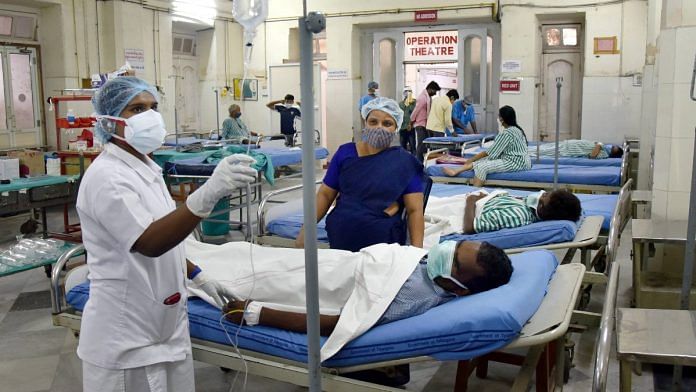Melbourne: Excessive use of the world’s most potent antibiotics has stoked drug-resistant infections in India for years. Now the country’s Covid crisis has put the calamity into hyperdrive.
A first look at how many patients hospitalized during India’s first coronavirus wave also developed bacterial and fungal infections found that a small but alarming proportion harbor germs that resist multiple drugs.
Doctors battling to save lives amid a dearth of effective treatments are turning to the drugs they have on hand — and a lot of those are antibiotics that other countries wouldn’t use for Covid-19. What’s more, the chaos of overrun hospitals means staff can’t always take precautions to ensure infections don’t spread from one patient to the next.
The use of antibiotics — especially some that the World Health Organization recommends holding back for the most difficult-to-treat cases — may be “adding fuel to the fire of the already alarming antimicrobial resistance levels,” Kamini Walia, a microbiologist with the Indian Council of Medical Research, and colleagues said Monday in a study. “Fear of missing a secondary infection and lack of specific therapy for Covid-19 leads to over-prescription of antibiotics.”
The research, published in the journal Infection and Drug Resistance, analyzed data from 17,534 Covid patients admitted to one of 10 hospitals in the council’s surveillance network from June 1 to Aug. 30, 2020. Among these, 640 patients, or 3.6%, had a secondary infection, though the incidence was as high as 28% in some hospitals.
Fatality rate
Almost 60% of patients who developed secondary infections died, compared with about 11% of those who didn’t, according to the study. The majority of fatal cases had diabetes, hypertension or another underlying health condition known to worsen the severity of Covid-19.
The data were collected when Covid cases were on the rise, and “the findings suggest that a lot of over-prescribing of antimicrobials happened during that time,” the authors said. Of the almost 27 million virus cases reported in India, 10 million have occurred just in the past month, overwhelming hospitals and leading to shortages of oxygen and other critical resources.
“Who knows what the mortality rates are now with the chaos in India and access to these heavy-duty antibiotics,” said Sanjaya Senanayake, an infectious diseases physician and associate professor of medicine at the Australian National University in Canberra. “It’s probably a lot worse now.”
Although there is no data to support the use of broad-spectrum antibiotics in Covid patients, the researchers found many are prescribed in India regardless, including carbapenem, the most potent antibacterial, and colistin, a last-resort drug used to treat the most stubborn antibiotic-resistant strains.
‘Alarming finding’
High rates of resistance in bacteria such as Klebsiella pneumoniae and Acinetobacter baumannii to these important drugs “is an alarming finding,” the researchers said. They cited additional surveillance data that indicated hospitals had observed a 2– to 3-fold increase in bloodstream infections from June to August 2020, compared with the previous year.
“If those organisms are giving serious infections, then they would be extremely difficult to treat,” said David Livermore, a professor of medical microbiology at the University of East Anglia.
The use of steroid medications that weaken the immune system, invasive procedures such as mechanical ventilation, and prolonged hospital stays make Covid patients especially vulnerable to hospital-acquired infections, the researchers said. They also pointed to the use of gloves as a risk, with health workers feeling the barrier negates the need to perform hand hygiene, enabling bugs on the personal protective equipment to move from one patient to another.
“It highlights an urgent need to improve infection-control practices in hospitals and also rationalize antibiotic prescriptions,” the researchers said.
Antibiotic resistance is one of the biggest threats to global health, food security, and development, according to the WHO. The problem is especially acute in India, where the misuse and abuse of antibiotics in humans and animals is amplified by inadequate hygiene and sanitation.
—With assistance from Bhuma Shrivastava. —Bloomberg
Also read: Antibiotics, zinc, steam: Kerala doctor wants black fungus cause hunt to go beyond steroids



